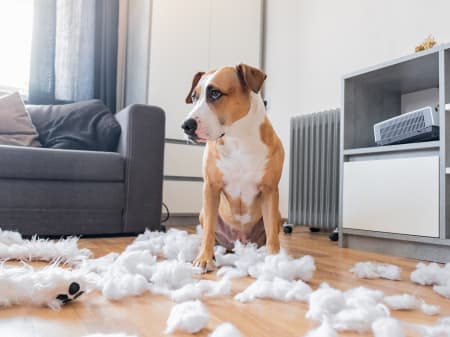What causes dog chewing problems?
Puppies and dogs explore the world by chewing on objects. For puppies, chewing can also help relieve pain that might be caused by teeth erupting through the gum line. For adult dogs, chewing can also help to keep teeth clean and jaws strong.
However, while chewing is typically a healthy behavior in dogs, there are a few reasons your pooch may chew excessively and destroy items left in his path.
Today, we'll explore those reasons and share some hints about how to steer your dog away from your things and towards more appropriate items. Plus, we have a few hints for keeping them entertained.

Puppy Teething
Similar to human babies, your puppy’s baby teeth will follow out naturally. Before this occurs, he’ll experience discomfort and pain as his adult teeth erupt. During this period, your puppy will attempt to relieve some of this discomfort with chewing.
Boredom
If your dog spends long periods of time alone without mental stimulation, she’ll become bored and may pass the time by finding interesting objects around the house to chew.
Hunger
Is your dog on a calorie-restricted diet? They may try to find other sources of nutrition by looking for objects to chew. These objects will usually be related to food or smell like food.
Stress & Anxiety
Because dogs are highly social animals, many suffer from separation anxiety while their humans are away. These dogs will often end up chewing to comfort themselves.
Managing & Redirecting Chewing
To prevent destructive chewing, start by identifying its cause and eliminating any of the problems listed above. Then, focus on redirecting your dog's chewing to more desirable objects, like chew toys.
Exercise
Start by making sure your dog gets plenty of exercise before leaving the house. High energy German Shepherds need at least two hours of exercise each day, while Pomeranians and other small dogs usually do well with about 40 minutes. Talk to your vet about how much physical activity your dog needs each day to be healthy and happy.
Entertainment
To help reduce separation anxiety or boredom in dogs who must be left alone for extended periods of time, try training your dog to associate alone time with positive experiences. Each time you leave, provide a puzzle toy stuffed with food, and a variety of fun, special toys that your dog only gets to play with while you are away (to retain the novelty).
Providing lots of interesting toys will not only create a positive association with alone time, it will also serve as a distraction from the objects that you don't want your dog chewing on, and prevent boredom chewing.
Dog Proofing
To ensure that your dog only chews designated objects like toys, remove all other temptations. Put valuable objects out of reach, make sure your laundry is put away or in a hamper, and that books and children's toys are stored away where they belong.
Discourage Unwanted Chewing
Spray any objects you don't want your dog to chew with a dog deterrent spray. If you encounter your dog chewing on an item they shouldn't be, say "no," take it away, and provide replace it with a chew toy, and then provide lots of praise when your dog chews on that.
Note: The advice provided in this post is intended for informational purposes and does not constitute medical advice regarding pets. For an accurate diagnosis of your pet's condition, please make an appointment with your vet.
